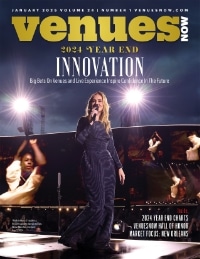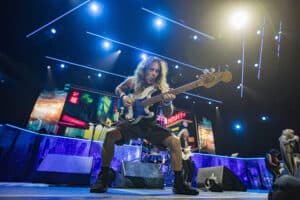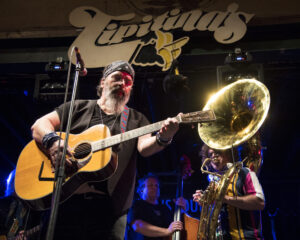SMALLER HALL: TD Music Hall at the Allied Music Centre is a 500-capacity space on the fourth floor, which had a Feb. 10 grand opening with The Halluci Nation. (Jag Gundu)
Massey Hall, Toronto’s historic theater that reopened in 2021 after a massive restoration project, will soon extend to the multi-venue Allied Music Centre.
The seven-story glass building, a $136 million (CAD$186.5 million) project attached to the south end of the downtown property, will be completed later this year and house four venues of differing sizes.
The “Grand Dame” of them all is Massey Hall, which can now accommodate 2,550 patrons seated and 2,800 with its retractable seats for a new GA floor option. The Corporation of Massey Hall and Roy Thomson Hall is a nonprofit charitable organization that also operates the 2630-capacity Roy Thomson Hall less than a mile to the west, in the theater district.
In February, the new TD Music Hall, a 500-capacity venue on the fourth floor of the Allied Music Centre, opened its doors with a concert by electronic outfit The Halluci Nation and three sold-out nights by rising Canadian R&B artist Dylan Sinclair.
One of the mandates of the Allied Music Centre, named after Allied Properties which made a “transformative contribution,” is to help nurture and develop artists. The ultimate goal is for artists to move up to headline Massey Hall.
Its Allan Slaight Stage, named after the late Canadian broadcast entrepreneur and philanthropist whose family donated CAD$10 million towards the renovation, holds a hallowed history.
The artists that have played there include Igor Stravinsky, George Gershwin, U2, Bob Dylan, Rush, Neil Young, Luciano Pavarotti, Bob Marley, Justin Bieber, Van Halen, Keith Richards and The Quintet (Dizzy Gillespie, Charles Mingus, Charlie Parker, and Max Roach), captured on the 1953 album Jazz At Massey Hall. Canadian icon Gordon Lightfoot has headlined the red room over 170 times, both closing it before the reno and the first to play it when it reopened.
The Revitalization Project was made possible because of the 2012 transfer of 4,804 square feet of land to the south of Massey Hall by Toronto’s MOD Developments and Tricon Residential. The lead architect was Marianne McKenna, principal at KPMB Architects; construction by Ellis Don; the acoustician Bob Essert from Sound Space Vision; and sound designer Martin Van Dijk from Engineering Harmonics.
The Corporation’s president and CEO Deane Cameron, who spent years running EMI Music Canada, championed the fundraising efforts, but died suddenly in 2019 before its completion. A recording studio on the 7th floor of the Allied Music Centre will be named after him.
In early 2020, the board of governors of the corporation appointed Jesse Kumagai to run the organization. He had been there since 2003, except for a two-year position as Vice President of talent with Live Nation Canada from 2014-2016, returning as director of programming, marketing and business development. Kumagai spoke to VenuesNow about TD Music Hall, Massey Hall and the overall vision for the Allied Music Centre.

ALLIED VENUES: The Allied Music Centre in Toronto, which contains the historic Massey Hall, reopened in November 2021 following a $136 million renovation. (Simon Tanenbaum)
VenuesNow: TD Music Hall is a new build, as opposed to the refurbishment of Massey Hall, working with the existing structure. What were the challenges?
Jesse Kumagai: This all came together because of an opportunity for us to acquire some additional land to the south of Massey Hall. It was always landlocked. Basically, the building occupied the entire footprint of real estate that we own so this created an opportunity to expand. The first priority was improving a lot of the Massey Hall aspect, everything from creating a loading dock for the very first time through to brand new bar and washroom spaces, so that the patron experience has dramatically improved, along with elevator access for accessibility needs. That was really the principal driver of the project. But since we had this additional real estate and the opportunity was there, we decided to try and add additional performance venues. We were certainly constrained by the amount of real estate we had. We tried to maximize the size of this new addition. It’s up on the fourth floor, so it’s immediately above the Massey Hall loading dock and new bars and backstage spaces. It’s a unique proposition in Toronto, being elevated up in the air. That also created some interesting opportunities as well. We installed floor to ceiling windows at both ends of the venue to give a unique vantage point to the city. Ultimately, it fit into our larger strategy because we’ve been presenting concerts in smaller venues for many years as part of our artist development initiatives. We recognized that there’s a real shortage of small venues in Toronto and a huge amount of opportunity. So, we decided to give it a go and add something permanent and sustainable to the ecosystem around here.
What are the other two venues?
The Muskoka Spirit Basement Bar [directly under Massey Hall, cap. 150]. There’s a stage with full sound and lights. We’ve been using it for late-night performances, so when we have a concert in Massey Hall, when that concludes we can put an artist on stage downstairs at 11 p.m, and keep things going for a while. It’s a great opportunity to put an emerging artist on stage or do something more intimate. On the sixth floor, there’s going to be a small theater, capacity around 100 people when seated, but it has a retractable seating system that can increase the capacity to about 150. It’s going to be a fantastic community space and opportunity for grass-roots arts organizations and independent promoters to put on smaller events for emerging artists, which fits into our artist development strategy. It’s a fantastic tool for us from an education perspective, because it will serve as a classroom for a lot of our music education, the community outreach programs. It can function as a rehearsal space or as a workshop space.
You’re limited by the size of the overall property.
TD Music Hall is adjacent to Massey Hall. An incredible amount of care was put into the design to ensure that there wouldn’t be any sound bleed between the two venues. So we have the capability of having a show with high sound levels in both venues. With that opportunity to expand with the additional real estate, and knowing that we could go up into the air to a certain height, we had a box to play with in terms of the physical space. Fortunately for TD Music Hall, the footprint we had was perfectly suited for a traditional shoebox-shaped room with conventional dimensions, which is fantastic for sound. The sound was the highest priority for us. We wanted the best sounding room of its type. We used Bob Essert, the same acoustician that worked on Massey Hall, to help guide this along with a number of other consultants and his own team.
What drove this new audio technology?
TD Music Hall has an immersive audio system, which is new and novel. It basically means that no matter where you stand in the room, you’re getting a fantastic audio mix, but it also creates additional freedom for artists. It’s a new tool that they can use where you can locate instruments and voices in three-dimensional space in the room, which is exciting new technology. I haven’t been able to completely verify this, but as far as I know it’s the first permanent installation in a music venue in Canada. In a conventional venue, you’d basically have a stereo pair of line arrays hanging above the stage, and that projects out and fills the room with sound. But the challenge with that is in order to provide good coverage for the back of the room, you have to blast the people up front and you get inconsistent sound throughout the room. With this, instead of the two speakers up front, we have 58 different speaker locations throughout the room.
Other 500-capacity music venues in Toronto are rock bars. This is the perfect setting for more sophisticated performances. What is your booking policy?
Toronto is a major music market, and it deserves to have a lot of different venues with a lot of different character and aesthetic. But we did design this to be as neutral as possible. We’re pretty genre-agnostic here. We wanted a venue that was going to be as suitable for something delicate, like a solo acoustic performance, all the way through to something far more impactful, like hip hop shows or big loud rock shows. We also wanted it to be an inclusive space, so when you take a look at the lineup of artists announced, it’s reflective of Toronto’s music scene. We’ve got contemporary R&B; singer-songwriter. It’s a wide range, reflective of the audiences in Toronto; a really diverse marketplace.
What backstage amenities are available for artists?
That’s one of the things that was a real priority for us was making the artist experience exceptional. This is a unique situation because it’s rare that you get an opportunity to have a purpose-built venue. The vast majority of the time you’re finding converted retail spaces or, at best, converted cinemas. But with this, it gives us the opportunity to be thoughtful about everything. Backstage space is always a challenge, and, in some venues, it can be an afterthought for artists. We wanted to make sure we were providing something comfortable and functional for their needs. One advantage of being up on the fourth floor is it gives us access to a lot of natural light, so there’s big green room with big windows. We have three separate dressing rooms in addition to that.

NEW CONFIG: The 128-year-old Massey Hall can now accommodate 2,550 seated and 2,800 with its retractable seats for a new general admission floor option. (Scott Norsworthy)
Massey Hall reopened more than a year ago. They did a beautiful job restoring it with respect so that it is really just new and improved — the uncovered stained glass, the new roomier seats, the reconfigured main floor, upgraded ceiling arches. What have been some of the comments you’ve received from artists and audience members who had been there before the renovation?
The first thing everybody comments on, regardless of whether it’s artists or fans, is a sense of relief that we haven’t done anything to fundamentally alter the character of Massey Hall. It was important for us to be reverent and respectful of its heritage. The worst thing in the world we could have done was something that would sterilize that and wash out some of that history. That’s a huge relief to us, that the people who feel so emotionally connected to the Hall feel like it’s been very well taken care of through all of this. People start to notice the improvements. The acoustics have been improved, but especially so for the artist performing on stage. The backstage areas and amenities were woefully inadequate before, and they’re now world class. The patron experience has been improved in different ways. The addition of bars, washrooms, accessibility throughout the space, improved comfort, wider seats and better sight lines. What’s really worth highlighting is the retractable seating system for the main floor. That creates the opportunity to have a portion of the audience in GA configuration. That was done intentionally to open the door for artists who want the energy of a crowd on their feet in front of them and opens up to a wider range of genres and invites a wider range of audience members in to enjoy it.
Do you expect TD Music Hall to be a stepping stone to Massey Hall?
Absolutely. From our perspective, we’re trying to provide an entire ecosystem where we can take an artist from the beginning, all the way to Massey Hall and TD Music Hall is a critical step in that journey. The hope is that we’re going to see a lot of artists who are performing on the stage at TD Music Hall go on to play Massey Hall in a few years.








